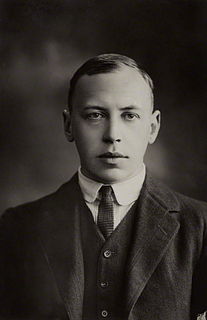A Quote by Thomas Carlyle
Does not every true man feel that he is himself made higher by doing reverence to what is really above him?
Related Quotes
No man could bring himself to reveal his true character, and, above all, his true limitations as a citizen and a Christian, his true meannesses, his true imbecilities, to his friends, or even to his wife. Honest autobiography is therefore a contradiction in terms: the moment a man considers himself, even in petto, he tries to gild and fresco himself. Thus a man's wife, however realistic her view of him, always flatters him in the end, for the worst she sees in him is appreciably better, by the time she sees it, than what is actually there.
There is within me a friend who consoles me every time that troubles overwhelm me and misfortunes afflict me. The man who does not feel friendship towards himself is a public enemy, and he who finds no confidant within himself will die of despair. For life streams out of man's inner self and in no way from what surrounds him.
Condemn no man for not thinking as you think. Let every one enjoy the full and free liberty of thinking for himself. Let every man use his own judgment, since every man must give an account of himself to God. Abhor every approach, in any kind or degree, to the spirit of persecution, if you cannot reason nor persuade a man into the truth, never attempt to force a man into it. If love will not compel him to come, leave him to God, the judge of all.
It is not to taste sweet things; but to do noble and true things, and vindicate himself under God's heaven as a God-made man, that the poorest son of Adam dimly longs. Show him the way of doing that, the dullest day-drudge kindles into a hero. They wrong man greatly who say he is to be seduced by ease. Difficulty, abnegation, martyrdom, death, are the allurements that act on the heart of man. Kindle the inner genial life of him, you have a flame that burns up all lower considerations.
The true Christians are the true citizens, lofty of purpose, resolute in endeavor, ready for a hero's deeds, but never looking down on their task because it is cast in the day of small things; scornful of baseness, awake to their own duties as well as to their rights, following the higher law with reverence, and in this world doing all that in their power lies, so that when death comes they may feel that humanity is in some degree better because they lived.
How much reverence has a noble man for his enemies!--and such reverence is a bridge to love.--For he desires his enemy for himself, as his mark of distinction; he can endure no other enemy than one in whom there is nothing to despise and very much to honor! In contrast to this, picture "the enemy" as the man of ressentiment conceives him--and here precisely is his deed, his creation: he has conceived "the evil enemy," "the Evil One," and this in fact is his basic concept, from which he then evolves, as an afterthought and pendant, a "good one"--himself!
It´s a good thing when a man is different from your image of him. Is shows he isn´t a type. If he were, it would be the end of him as a man. But if you can´t place him in a category, it means that at least a part of him is what a human being ought to be. He has risen above himself, he has a grain of immortality.
How does one chip off the marble that doesn't belong? ... That comes about through five things: humility, reverence, inspiration, deep purpose, and joy. No great man has ever wise-cracked his way to greatness. Until one learns to lose one's self he cannot find himself. No one can multiply himself by himself. He must first divide himself and give himself to the service of all, thus placing himself within all others through acts of thoughtfulness and service.
Man is a spiritual being, a soul, and at some period of his life everyone is possessed with an irresistible desire to know his relationship to the Infinite. . . . There is something within him which urges him to rise above himself, to control his environment, to master the body and all things physical and live in a higher and more beautiful world.



































